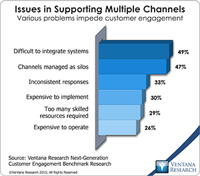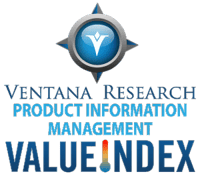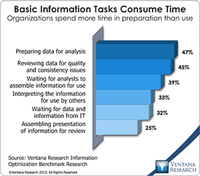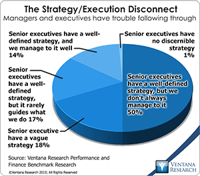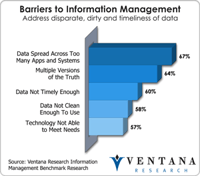This year, I attended Informatica World 2019, Informatica's annual user conference. The main focus this year was on the cloud with a heavy does of AI. Under that focus, Informatica's conference emphasized capabilities across six areas (all strong areas for Informatica): data integration, data management, data quality & governance, Master Data Management (MDM), data cataloging, and data security.
Read More
Topics:
Big Data,
Data Quality,
Master Data Management,
Data Governance,
Data Management,
Informatica,
data lakes,
Informatica World,
Data Storage
Stibo Systems has been providing product information management (PIM) software for decades. Its work has helped many organizations worldwide take control of their product information by developing a master definition that can be published across many channels from Web to digital to print. We recognized its work with customers Delta Faucet and Masco Corp. in our 2015 Ventana Research Leadership Award in Information Management. In 2014 Stibo Systems customer Brady Corp. won a similar award for...
Read More
Topics:
Master Data Management,
Sales,
Sales Performance,
Supply Chain Performance,
Customer Experience,
MDM,
Mobile Technology,
PIM,
Stibo Systems,
Customer Performance,
Operational Performance,
Business Performance,
Cloud Computing,
Financial Performance,
Information Management,
Business Performance Management (BPM),
Financial Performance Management (FPM),
Information Optimization,
Product Information Management
This has been a dramatic year for Informatica, a major provider of data integration software. In August it was acquired and taken private by Permira funds and Canada Pension Plan Investment Board for about US$5.3 billion. This change was accompanied by shifts in its management. CEO Sohaib Abbasi became chairman and now has left, and many executives were replaced while Anil Chakravathy became CEO from being the Chief Product Officer. The new owners appear to have shifted the company’s strategic...
Read More
Topics:
Big Data,
Data Quality,
Master Data Management,
MDM,
Operational Performance Management (OPM),
Cloud Computing,
Data Integration,
Data Management,
Data Preparation,
Governance, Risk & Compliance (GRC),
Informatica,
Information Management,
Business Performance Management (BPM),
Information Optimization,
Risk & Compliance (GRC)
The importance of product information management (PIM) has become clear in recent years and especially as it relates to master data management. As I recently wrote handling this business process effectively and using capable software should be priorities for any organization in marketing and selling its products and services but also interconnecting the distributed supply chain. Our research on product information management can help organizations save time and resources in efforts to ensure...
Read More
Topics:
Big Data,
Master Data Management,
Sales Performance,
Supply Chain Performance,
Enterworks,
Marketing,
Operational Performance Management (OPM),
Stibo Systems,
Webon,
Business Performance,
CIO,
Financial Performance,
IBM,
Informatica,
Information Management,
Oracle,
Information Optimization,
Product Information Management,
Riversand
Ventana Research defines product information management (PIM) as the practice of using information, applications and other technology to effectively support product-related processes across the customer, commerce and supply chain. As organizations increase the number and diversity of products and services they offer to customers and partners, they increasingly need to address limitations in the ways they manage and distribute product information, including related attributes and content that...
Read More
Topics:
Big Data,
Master Data Management,
Supply Chain Performance,
Governance,
Marketing,
Operational Performance Management (OPM),
CIO,
Information Management,
Business Performance Management (BPM),
Financial Performance Management (FPM),
Information Optimization,
Product Information Management,
Sales Performance Management (SPM)
Organizations today create and collect data at ever faster rates, and this introduces challenges in ensuring that data is not just managed but used in a consistent manner for a range of operational and analytic tasks. This is made more difficult by new data sources whose definitions vary from standard and widely used formats. Making all information available and consistent is essential to support business processes and decision-making. A key technology tool for this effort is master data...
Read More
Topics:
Big Data,
Data Quality,
Master Data Management,
Sales,
Sales Performance,
Social Media,
Supply Chain Performance,
Golden Records.,
MDM,
Operational Performance,
Analytics,
Business Analytics,
Business Performance,
Cloud Computing,
Customer & Contact Center,
Data Management,
Financial Performance,
Information Applications,
Information Management,
Workforce Performance
At the Informatica World 2014 conference, the company known for its data integration software unveiled the Intelligent Data Platform. In the last three years Informatica has expanded beyond data integration and now has a broad software portfolio that facilitates information management within the enterprise and through cloud computing. The Intelligent Data Platform forms a framework for its portfolio. This expression of broad potential is important for Informatica, which has been slow to...
Read More
Topics:
Big Data,
Master Data Management,
Sales Performance,
Supply Chain Performance,
Operational Performance,
Business Analytics,
Business Intelligence,
Business Performance,
CIO,
Cloud Computing,
Customer & Contact Center,
Data Integration,
Data Management,
Financial Performance,
Informatica,
Information Applications,
Information Management,
Workforce Performance,
Information Optimization,
Product Information Management,
application
This is the beginning of the season when companies that are on a calendar year begin their strategic and long-term planning. Ventana Research performed an extensive investigation in this area with our long-range planning benchmark research. Strategic and long-range planning is a process and discipline that companies use to determine the best strategy for succeeding in the markets they serve and then ensure they have the capabilities and resources needed to support their strategic objectives.
Read More
Topics:
Big Data,
Master Data Management,
Performance Management,
Planning,
Sales Performance,
Supply Chain Performance,
Human Capital Management,
Office of Finance,
Reporting,
Budgeting,
dashboard,
Operational Performance,
Analytics,
Business Performance,
Customer & Contact Center,
Financial Performance,
Workforce Performance,
CFO,
Data,
CEO,
Financial Performance Management,
FPM
Information management is important to every line of business that seeks to improve its business processes and decision-making. In response to pressure from those departments, CIOs and IT organizations must examine whether they have focused enough on the I for information and not just the T for technology, and if they have not, commit to taking this responsibility more seriously than in the past. Informatica is one vendor that realizes the potential of its information beyond just data...
Read More
Topics:
Data Quality,
Master Data Management,
PowerCenter,
Operational Performance,
Analytics,
Business Analytics,
Business Performance,
CIO,
Cloud Computing,
Data Integration,
Information Applications,
Information Management,
Information Optimization,
Vibe
One of the most important ongoing challenges in human capital management is to do master data management (MDM) of core human resources information more effectively. This challenge is often most complex for large organizations that have operations spread around the globe and HR management systems in each country or each operating division. To address this issue, SumTotal Systems recently announced the release of elixHR Platform at its TotalConnection user conference. This is the latest evolution...
Read More
Topics:
Master Data Management,
Social Media,
HCM,
Business Analytics,
Business Intelligence,
Business Performance,
Financial Performance,
Information Management,
Workforce Performance,
Workforce Analytics,
HR Management(HRMS),
SumTotal



